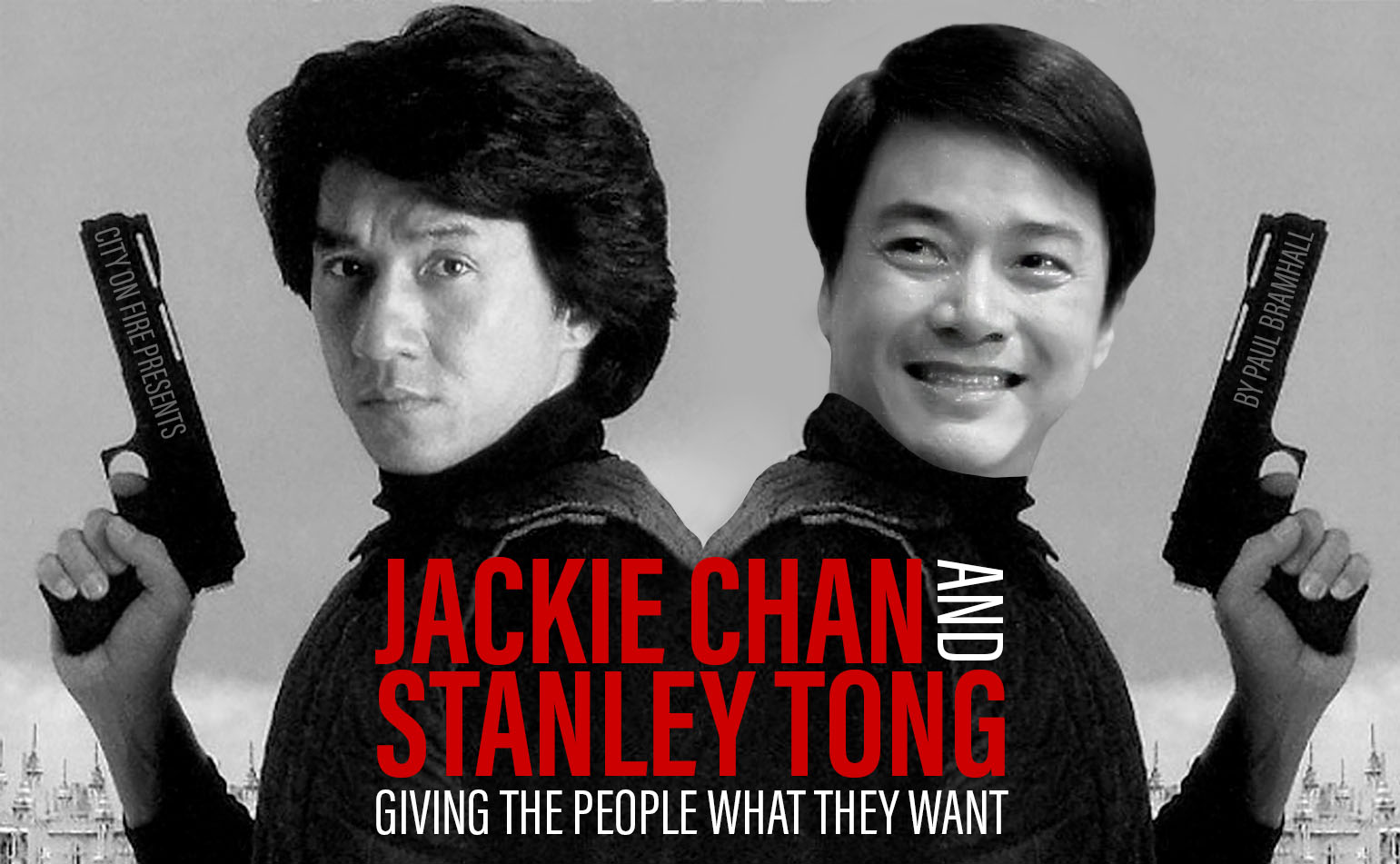 It may come as a surprise, but the only director who’s worked with Jackie Chan more than Stanley Tong is Lo Wei. Of course the relationship between star and director is quite different. Chan cranked out 7 movies with Lo Wei at the helm in the 4 years spanning 1976 to 1979, starting with the intolerable New Fist of Fury and concluding with Dragon Fist, one of Chan’s best old-schoolers. It’s well known that Chan wasn’t happy being under contract to the Lo Wei Motion Picture Co., which is the complete opposite to the star’s relationship with Stanley Tong.
It may come as a surprise, but the only director who’s worked with Jackie Chan more than Stanley Tong is Lo Wei. Of course the relationship between star and director is quite different. Chan cranked out 7 movies with Lo Wei at the helm in the 4 years spanning 1976 to 1979, starting with the intolerable New Fist of Fury and concluding with Dragon Fist, one of Chan’s best old-schoolers. It’s well known that Chan wasn’t happy being under contract to the Lo Wei Motion Picture Co., which is the complete opposite to the star’s relationship with Stanley Tong.
To date the pair have worked in the capacity of star and director 6 times, however unlike Chan’s 4-year stint with Lo Wei, his collaborations with Tong to date have spanned a whopping 28 years. Sometimes leaving gaps of more than a decade between collaborations, the question of what keeps drawing Chan and Tong back together no matter how much time passes is an interesting one. With this feature, we decided to delve into their shared filmography to explore the theory that, whenever Chan wanted to produce a piece of sure-fire populist entertainment, Tong was the director he’d turn to.
Former stuntman Tong pulled a Jackie Chan-esque style move with his directorial debut in 1991, Stone Age Warirors, wearing multiple hats including producing, writing, choreographing, and of course directing. He stopped short of appearing in front of camera, but his can-do attitude was enough to capture the attention of both Chan and the execs at Golden Harvest, and within the year he was hired to helm the 3rd instalment in Chan’s Police Story series. After spending the latter half of the 80’s directing, starring, writing, producing, and choreographing most of his movies, in 1991 Chan would step into the director’s chair for Armour of God II – Operation Condor, after which he wouldn’t direct again for over 20 years. Most likely exhausted, Chan was looking for someone else to do the heavy lifting behind the camera, and it was Tong who’d be offered the golden chance.
While many cite Dragon Lord as being the production that saw Chan step away from traditional kung fu and focus on a more stunt heavy action aesthetic, it would be Police Story 3: Supercop 10 years later which really saw that line of thinking come to fruition. In reality Chan still littered his movies after Dragon Lord with plenty of fight scenes, shifting from the traditional kung fu style to modern kickboxing, with productions that focused purely on stunt work (Project A II) being the exception rather than the rule. However Police Story 3 was different, not only being more stunt focused, but also marking the beginning of an era when the opposite came to pass. Post 1992 Chan’s output noticeably shifted away from extended fights, making any movie that was fight heavy the exception (Drunken Master II, Who Am I?), and the stunt filled spectacle the new normal.
It’s often said that Chan decided to move away from intricate fight choreography to focus more on spectacle heavy stunt work during this period in order to appeal more to an international audience, a possible pre-emptive move to break into Hollywood before the 1997 handover. While there’s some merit to this theory, I’d argue its equally the case that Tong as a director was more interested in constructing stunts than he was choreographing or filming fight scenes. A look at his other titles as director, such as Project S and China Strike Force, show a similar approach that leans more towards extended action sequences rather than setting up fight scenes (in my 2015 interview with Won Jin, he amusingly expressed his disdain at how little he had to do in China Strike Force).
Regardless of Chan’s international ambitions though, out of all his collaborations with Tong, it’s 1992’s Police Story 3 that feels most like a Hong Kong movie. All of their joint ventures involve globe trotting in some way, and the third instalment is no different, taking place in Mainland China (which was treated like another country back in the early 90’s!) and Malaysia. Here it feels like Chan is just about still playing Chan Ka-Kui, although the character is diluted of the intensity he came with in the first 2 entries, and his long suffering girlfriend May, played by Maggie Cheung, is reduced to a throwaway cameo role. For all intents and purposes, Police Story 3‘s connection to the previous entries feels tenuous, with Tong’s disregard for continuity showing up in instances such as Mars now cast as a villainous henchman rather than one of Chan’s colleagues.
Future collaborations would dilute the line further between Chan the family entertainer and Chan playing an actual character, with storylines becoming increasingly simplistic and uninspiring, however in the Hong Kong cut of Police Story 3 there’s at least some grit still on display. We witness girls being shot up with heroin, and one who’s overdosed being disposed of in a particularly callous way, reminding us that the previous Police Story entries were never supposed to be kid flicks.
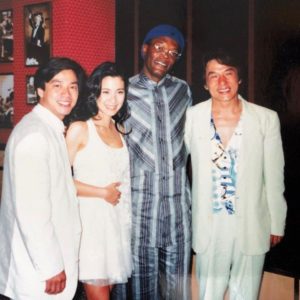
Stanley Tong, Michelle Yeoh, Samuel L. Jackson and Jackie Chan at the U.S. premiere of Police Story 3.
Tong’s real ace up the sleeve helming his first big blockbuster though was the casting of Michelle Yeoh, here returning to the screen following her divorce from Dickson Poon of D&B Films, which saw her retired for 5 years. It was the first time for Chan to share co-star status with someone other than his Peking Opera brothers Sammo Hung and Yuen Biao, and such was his ego we’d have to wait 6 years for him to share co-star status with someone again, finally conceding to Chris Tucker for Rush Hour in 1998. When it came to sharing co-star status again with a woman it took a whole ten years, eventually succumbing to Jennifer Love Hewitt in 2002’s The Tuxedo, a movie I’m not sure anyone would be willing to say was worth the wait.
Chan and Yeoh seemed to be looking to outdo each other in the action stakes, leading to a finale full of vehicular mayhem which includes highlights such as Yeoh jumping a motorbike onto the top of a moving train, and Chan hanging off a rope ladder attached to a helicopter high above Kuala Lumpur. So impressive is the final reel, that the fact Tong cast Yuen Wah and did precisely nothing with him is almost forgivable. Police Story 3: Supercop proved to be a success, leading to Tong not only being hired to helm Chan’s attempt at breaking into the US a couple of years later in the form of Rumble in the Bronx, but also to create a spin-off movie for Michelle Yeoh’s character. Project S (or Supercop 2 as it’s known in some territories) was released in 1993 and features an amusing cameo from Chan in drag as his character Chan Ka-Kui, which is almost worth the price of admission.
Chan had a tumultuous time in the intervening couple of years, banging heads with Wong Jing on 1993’s City Hunter (which famously led Jing to cast Jacky Cheung as a satirical take on Chan’s persona in 1995’s High Risk), and replacing the preferred choice of Jet Li in Kirk Wong’s Crime Story the same year. Chan’s ego led to more clashes in 1994, this time with the legendary Lau Kar Leung on Drunken Master II, whose creative vision was so different that he ultimately left the production before filming was complete. Needless to say that by the time 1995 came around, Chan was likely relieved to be working with Tong once more on their sophomore collaboration, a production intended to break Chan into the US market after several failed attempts throughout the early to mid 80’s.
Rumble in the Bronx was in fact filmed in Vancouver, a fact given away by the occasional glimpse of the Rockies in the background. More so than Police Story 3, Chan and Tong’s sophomore pairing would cement the type of wholesome action flick aimed at an international audience that they’d continue to crank out for the rest of the 90’s. Playing a cop who ends up protecting a supermarket being run by Anita Mui (reunited after the previous years Drunken Master II where Mui played Chan’s mother!) from a biker gang, Rumble in the Bronx shows off all the strengths of Chan and Tong’s pairing, as well as all of its weaknesses. It was also the movie that famously coined the phrase – ‘No Fear. No Stuntman. No Equal’. At least one part of that certainly wasn’t true, however it was a tagline that Chan was more than happy to play to in the media.
What’s perhaps most interesting about the ‘No Stuntman’ part is that the most impressive stunt in Rumble in the Bronx isn’t in fact performed by Chan, but rather by Tong stepping in as his stunt double. The stunt sees Tong jump off the top of a carpark building and land on a stamp sized balcony across the street to escape the biker gang, and is one of those heart jump into your mouth moments that only the most brazen of stunts are capable of inducing. Fight action is again dialled back, although ironically the brief bursts we do get deserve a mention in any discussion on Chan’s choreography style.
Unlike the Wing Chun dummy action which is only teased in Wheels on Meals, more than 10 years on here Chan fully let’s loose on the iconic apparatus in a suitably impressive display of power and precision. Similarly, when it comes to incorporating props into a fight scene, the sequence that takes place in the biker gangs’ den is a masterclass in physical dexterity and sheer creativity. In a filmography filled with iconic prop usage, this scene is one of if not the best out of all of them. Everything around the action though is painful, with a questionable attempt at a plot that seems to have had less attention paid to it than some of those Hong Kong movies that didn’t even have a script when they started filming. Chan is less a character here and more an onscreen personification of the all-round nice guy image that he increasingly fell back on in the 90’s.
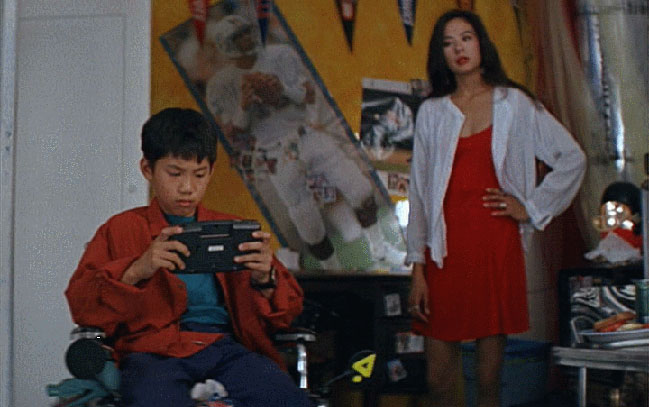
No Fear. No Stuntman. No Video Game Cartridge.
Apart from helping out a wayward Francoise Yip to get her life back on track, he also takes time to bond with her wheelchair bound kid brother (complete with English dialogue like “I wish my legs were normal so that I could play with my sister in the park”), played with a grating level of annoyance by Morgan Lam in his one and only film appearance. At its most incomprehensible, Chan ends up randomly making friends with the biker gang after he helps them to see their error of their ways (via offering to have a cup of tea together), which leads to a diamond smuggling group of gangsters being introduced into the plot from nowhere.
The lore behind Rumble in the Bronx is of particular interest, as it’s well known that Chan broke his right ankle when he jumped onto the hovercraft in the bombastic finale. While it’s frequently said that the injury prevented Chan from having a final fight scene that was planned, Tong’s style of filmmaking makes for a legitimate argument that the whole hovercraft sequence was always going to be the intended finale. Adding to this line of thinking is a similar sequence involving a dump truck that would be used for the finale of Mr. Nice Guy, a production helmed by Sammo Hung a couple of years later that opted for a similar approach over any kind of final fight. Regardless of the mixed feelings towards the finale, Tong’s approach had the desired result, and in 1996 Rumble in the Bronx was released across 2000 cinemas in the US making Chan a household name.
On top of breaking Chan into the US market, Rumble in the Bronx was also the top grossing Hong Kong movie for 1995, which pretty much guaranteed a Tong and Chan reunion. Audiences wouldn’t have to wait long, as the following year they paired up once more for Police Story 4: First Strike, a production that was originally intended to be a stand-alone tale, but due to popular demand was rejigged to be another Police Story entry. How much effort went into rejigging it is debatable. First Strike is guilty of being the movie which kicked off the naming convention of whatever character Chan was playing being called, wait for it – Jackie Chan. Gone is the character known as Chan Ka-Kui, and instead Chan spends the whole moving answering to his own name. In many ways the cycle was complete, Chan was now playing himself.
Also gone was the intensity and sense of injustice that Chan imbued Ka-Kui with in his self-directed original and sequel, and in his place was the bumbling everyman who had a gift for fighting that came to dominate Chan’s mid to late 90’s output (see also Who Am I?). Even Maggie Cheung’s long-suffering May is nowhere to be seen, replaced by a pair of novelty Koala bear briefs, with the only slim connection to previous entries being the presence of the late Bill Tung. What can’t be denied is that First Strike cemented the Chan and Tong style of filmmaking – Jackie Chan plays himself in paper thin plots full of foreign ‘actors’ who behave like they belong in a kids TV show, played off against showstopper stunt work. Out of all their collaborations it’s this one which most embodies these elements, with its enthusiasm to appeal internationally often woefully misplaced.
Playing out like Tong’s go big or go home homage to James Bond, First Strike ups the ante so much that Chan is now responsible for tracking down a stolen nuclear warhead that could blow America off the map (who said Chan only stopped being loyal to Hong Kong in the 2000’s!?). Recruited by the CIA, here Vancouver is swapped for the Gold Coast in Australia, which notably isn’t masquerading as any city it blatantly isn’t. Like Rumble in the Bronx the primary language in First Strike is English, although there’s also a variety of other languages spoken as well, of which the ridiculously broad Bogan-esque Australian tones certainly deserve their own mention. Speaking of Australia, this is a land down under where hotel rooms come with their own koala, surely setting up anyone who planned a vacation there after the movie’s release for severe disappointment.
Tong is clearly enjoying playing with a large budget here (at least by Hong Kong standards), but it’s also clear at this point that he doesn’t have much ability as a filmmaker, with the characterisation and storylines if anything getting progressively worse after Police Story 3: Supercop. What First Strike shows Tong does do well is to construct a constant stream of action beats which prevent the audience from considering an early exit, and similar to the gang den scene in Rumble in the Bronx, here the pair also throw in a standout fight scene. The ladder fight in First Strike, which has Chan fending off several attackers by brandishing a foot ladder, shows all of the choreographic touches that make Chan’s brand of action so entertaining, and is a triumph in creativity.
Equally entertaining but far less discussed is the hotel escape from 2 oversized burly bruisers (one of which is Nathan Jones making his movie debut), a sequence that perfectly balances physical comedy with high risk stunt work performed so casually it almost risks not registering. Another trope that First Strike introduced is Chan’s habit of ‘introducing’ his female co-stars. With no recognisable Hong Kong names like Michelle Yeoh and Anita Mui to rival Chan’s screen presence, First Strike offered up the debut of Annie Wu, who spends most of the runtime either in or taking off a wetsuit (this ‘introducing’ trend would continue with Miki Lee the following year in Mr. Nice Guy, and Michelle Ferre in Who Am I? the year after). It’s safe to say there was little risk of Chan being overshadowed by any of the female cast members anymore.
Like Rumble in the Bronx, First Strike was successfully distributed in the US, although it came with a whopping 20 minutes cut off its original 110-minute runtime. It was rumoured at the time that a fifth entry in the Police Story series was on the way, but the 1997 handover saw a mass exodus of Hong Kong talent leap across the pond to try their hand in Hollywood, and Chan and Tong were no exception. Their globe trotting partnership that was anchored in Hong Kong didn’t continue stateside though. Tong swapped out Chan for Leslie Nielsen (not a line I ever thought I’d write) to direct 1997’s Mr. Magoo, and Chan hooked up with Money Talks director Brett Ratner for Rush Hour, which paired him with Ratner’s Money Talks lead Chris Tucker.
Unlike Tong though, who after his Hollywood outing returned to Hong Kong (making China Strike Force in 2000), Chan would remain primarily working in the States for the next 6 years, intermittently popping up in HK movies for a cameo (with the exception of 1999’s Gorgeous and 2001’s The Accidental Spy). While many understandably figured Chan was enjoying being paid far larger amounts than he was in Hong Kong for doing far less (which gradually became truer the longer he was there), from interviews at the time of Rush Hour’s release it seemed that he was genuinely frustrated at how risk-averse Hollywood was. Now needing to satisfy insurance safety standards and unions, even so much as jumping onto a container was considered a risky move, and Chan’s distinctive action aesthetic found itself stifled and drowned out by his shouty co-star.
By the mid-2000’s it seemed many of the fears of how much control China would exert over Hong Kong (and its film industry) were largely unfounded, and gradually the talent that had left HK began to come back. Chan was one of them, who returned to Hong Kong filmmaking in earnest in 2004 to headline director Benny Chan’s New Police Story. Far from being the fifth entry that was rumoured after First Strike, this Police Story was a new tale with Chan playing a different character (to clarify – neither Chan Ka-Kui or Jackie Chan). Now 50 years old, Chan’s more mature casting as a cop who becomes a depressed alcoholic after his team is killed off by a ruthless gang was largely seen at the time as a sign of things to come. That trail of thought didn’t last long though.
By 2005 almost a decade had passed since Chan and Tong had worked together. In that time Chan headlined 12 movies (7 of which were Hollywood flicks), while Tong had directed, well, the previously mentioned China Strike Force. It’s perhaps telling of Tong’s directorial talents that he was all but out of work without his go-to leading man (or rather, being his leading man’s go-to director), and even more so of just how much control Chan likely had over the productions Tong was directing in terms of creative input. Regardless of Tong’s barren filmography though since they parted ways, after New Police Story Chan would team up with him once more for 2005’s The Myth, which gave us the first Jackie Chan 2-for-1 since Twin Dragons.
Clearly looking to appeal to as broader audience as possible, The Myth aimed to tick a number of audience demographics, as all of Chan and Tong’s productions increasingly did. Of course there was the loyal Hong Kong fanbase, who at this point had yet to sour to Chan (Willie Chen was still keeping him reigned in!), the increasing popularity of Korean cinema saw the casting of Kim Hee-seon (Ghost in Love) and Choi Min-soo (Sword in the Moon), and it was partially filmed in India with Bollywood bombshell Mallika Sherawat. Perhaps in one of the final examples of a Hong Kong movie catering to its Korean audience, the theme song ‘Endless Love’ was sung as a duet by Chan and Hee-seon, with Chan singing in Mandarin and Hee-seon in Korean. Bring your barf bag.
The lead up to the release of The Myth was an entertaining one. Chan and Tong made a point in interviews of stating it was going to be a different type of Chan flick than audiences were used to seeing, and at its most absurd they called a special press conference in India to address rumours that were circulating around the casting of Mallika Sherawat. The rumour involved Sherawat’s casting over other Bollywood actresses being down to her willingness to perform a scene which involved nudity. It got so out of hand that the press conference was called so that Chan and Tong could explain that Sherawat’s casting was based on her acting talent and that alone (just like CNN reporter Michelle Ferre in Who Am I?!). Needless to say, those going into The Myth expecting the ‘different type of Chan flick’ to be one that involves nudity will walk away disappointed.
The Myth is both different and the same, coming across like 2 separate movies which have been uncomfortably tied together. Perhaps Tong should have called Godfrey Ho for some tips. In the Qin Dynasty era Chan plays a General tasked with delivering the Emperor’s bride-to-be, played by Hee-seon. Ambushed on the way, Chan and Hee-seon are the only survivors, leaving them to complete the journey alone and for a forbidden romance to flourish. In the present, Jackie Chan is Jackie Chan (I mean, archaeologist Jack). Chan heads off to India to investigate a claim involving rocks that can make stuff float, and while raiding a tomb comes across a painting of Hee-seon, triggering memories from his past life as the Qin Dynasty General! Past and present collide in awkward and not entirely coherent ways, leading to a Chan and Tong flick which is different, but not necessarily better.
While the present-day narrative that takes place in Hong Kong and India plays out like a typical Chan and Tong collaboration, the Qin Dynasty era sections are tonally jarring, and show Tong as a director completely out of his depth. Throwing in a bombastically swelling orchestral score in practically every scene Chan and Hee-seon share together, it’s cringe worthy stuff, which is a shame because Chan’s performance here is effective. He comes across as genuinely conflicted and increasingly exhausted by the weight of his own armour, a far cry from the familiar nature of the present-day scenes. The Myth’s period battlefield setting predated Red Cliff by 3 years, which triggered a slew of similar period-set productions, with Chan himself returning a decade later in 2015’s Dragon Blade, so here it was both fresh and truly ‘different’ to see Chan in such a setting.
However Tong’s direction isn’t strong enough to take advantage of the unique premise, so any gravitas Chan’s performance earns is quickly dispelled by his superpowered horse (anyone who’s seen The Myth will understand). The first Chan and Tong collaboration to incorporate (ropey) CGI, at one point Chan himself is rendered by CGI for the kind of jump he’d likely have made himself in the previous decade, heralding the first time for his fanbase to be confronted with the fact he was no longer in his life-risking prime. If anything, The Myth makes a 180 pivot from the stunt heavy focus of their 90’s collaborations, and shifts to place more emphasis on Hollywood style special effects.
Like the biker gangs den sequence in Rumble in the Bronx and ladder fight in First Strike, The Myth still manages to give us one vintage Chan sequence, with a joyously creative conveyor belt fight set in a glue factory involving Chan and Sherawat taking on various attackers being a highlight. However the finale foregoes both stunt work and fight action for an SFX heavy sequence that has everyone floating around in an emperor’s tomb. As a finale it marked the biggest departure to date of what audiences expected from a Jackie Chan flick, with Tong seemingly relying on the CGI environment filled with various floating objects to provide the spectacle over any kind of physicality. It was a strange ending to a strange movie, complete with a bloated 2+ hour runtime that at times felt much longer, proving that Chan and Tong were perhaps at their best sticking to what they know.
The Myth failed to kick start a new string of collaborations between Chan and Tong, and the pair wouldn’t work together again for the next 12 years. Instead Chan chose to re-team with New Police Story director Benny Chan for Rob-B-Hood the following year, and would reunite a 3rd time for 2011’s Shaolin. However the cinematic landscape that Chan played in was rapidly changing. While he resumed working in Hollywood for the later half of the 00’s, cranking out the likes of Rush Hour 3 and The Spy Next Door (as well as lending his voice to the Kung Fu Panda flicks), China’s rapid economic development saw the rise of a burgeoning middle class that loved to go to the cinema. During the beginning of the 2010’s cinemas were being built across China in their hundreds, quickly making the Mainland one of the biggest box office draws for movies to play to.
This global shift to where movies could make the most money saw an increasing number of US and China co-productions, which included 2008’s The Forbidden Kingdom and 2010’s The Karate Kid, but it was 2011 that proved to be a landmark year. 1911 marked Chan’s 100th movie, and concurrently was made to celebrate the 100th anniversary of the founding of the Republic of China. While now China’s jingoistic and propaganda heavy output is a given, 10 years ago productions like 2009’s The Founding of a Republic (which Chan also featured in) and 2011’s Beginning of the Great Revival where seen as overlong oddities aimed purely at a domestic audience. Chan’s decision to headline 1911 as his landmark 100th movie sent a clear (and for many hard to swallow) message that he aligned himself with the Chinese Communist Party.
Much of his HK fanbase felt betrayed. Watching Chan crank out lacklustre Hollywood efforts was one thing, but positioning himself politically within the context of his role as a movie star felt like a knife in the back. Despite this, he still appeared to feel a sense of loyalty to his Hong Kong fanbase (even if it wasn’t reciprocated), so before embarking on what looked set to be a more serious acting career focused on Mainland audiences, he decided to go out with a bang. In 2012 he’d step into the directors’ chair for the first (and so far last) time since 1991’s Armour of God II – Operation Condor, to direct a sequel to it no less, that would become CZ12. Chan made it clear that it would be his last big action movie, citing the fact he was tired and felt the world was becoming too violent. He still intended to make movies, but after this his focus would be more on acting than fighting.
However the movie studios had other ideas. Almost 60, the following year he’d re-team with Little Big Soldier director Ding Sheng for Police Story 2013, a tie-in to the franchise by name only that once again saw Chan willing to play an age appropriate role. However conflicts behind the scenes were reported in the press – Chan felt his role shouldn’t involve any action at all, but the producers had slapped the Police Story tag on the title and insisted it needed Chan to fight at least once to appease audience expectations. In the end it felt like he didn’t have much choice but to go ahead with the awkwardly shoehorned in fight scene that rightfully split audiences down the middle. Perhaps the lesson Chan took away from Police Story 2013 was that, whether he liked it or not, studios wanted Mainland targeted action flicks based on when he was in his 40’s, not his 60’s.
So began a string of movies that were built around Chan attempting to re-capture his younger glory days for a new audience. 2016’s Skiptrace saw him partnered with Johnny Knoxville in a collaboration which recalled his late 90’s/early 00’s Hollywood vehicles, and Railroad Tigers from the same year brought back a level of Tong-esque goofiness. It’s perhaps not surprising then, that a year later we’d get our first Chan and Tong collaboration since 2005’s The Myth. In 2017 the world was graced with Kung Fu Yoga, an apparent sequel to The Myth in much the same way that First Strike is a sequel to Police Story 3: Supercop. Chan is still the archaeologist character (now frequently referred to as “the greatest archaeologist in China”), and the selling point here is another jaunt across to India, however that’s where the similarities end.
Kung Fu Yoga is arguably the most blatant example of a propaganda blockbuster to come out of China in recent years, coming across as a barely concealed fluff piece to boost relations between China and India. Like Chan and Tong’s collaborations in the 90’s aimed at breaking into the US, here once more English is the primary language used, with Disha Patani in the Bollywood bombshell role that Mallika Sherawat played in The Myth. Ironically Chan, now 63, here seems to be playing a younger character than he was 12 years earlier. Watching him ogle Patani, 38 years his junior, is not something anyone really needs to see (and to think there were those who complained about the 22-year age gap between Chan and Shu Qi in 1999’s Gorgeous!). However watching Chan eye up someone young enough to be his daughter is the least of Kung Fu Yoga‘s issues.
The many interactions between the Chinese and Indian cast, full of amicable smiles and banterous dialogue, are enough to make your ears bleed. There’s a treasure buried somewhere along the China and India border, and it would be great if everyone teamed up to look for it together, not just because their partnership will help improve the relationship between the two countries, but it also aligns with China’s ‘One Belt, One Road’ initiative! This exchange actually takes place, with the only consolation today being that the ‘One Belt, One Road’ initiative is more than likely on ice, after Chinese soldiers stoned and bludgeoned 20 Indian soldiers to death in 2020 at the same border being discussed in the movie. Whoever said propaganda works?
When watching Kung Fu Yoga, in retrospect the dialogue in the likes of Rumble in the Bronx and First Strike is Oscar worthy, as are the action sequences. After Railroad Tigers this was the 2nd movie to partner Chan up with younger co-stars, here represented by K-pop boyband member Lay Zhang, “the most beautiful Chinese yoga coach” Miya Muqi, and one-time Bruce Lee actor Aarif Rahman. Not that any of them get to do much, with a surprising lack of any kung fu or yoga. Instead, the runtime is filled with various escapades that involve our super friendly cast running away from CGI wolves, CGI hyenas, CGI snakes, and even a CGI lion that ends up involved in a car chase, which results in it throwing up CGI vomit. Apparently Tong didn’t realise the error of his ways with the finale of The Myth, and if anything seemed to believe that audiences wanted more of it!
The barely there plot involves the families descendent who the treasure used to belong to hunting down Chan and co. to claim back what he believes is rightfully his, although Chan’s impassioned yelling of “This treasure belongs to the Chinese government!” may make you feel differently. Played by Bollywood actor Sonu Sood, events eventually culminate in an underground temple in India (much the same way as The Myth finished up in an emperor’s tomb, proving that Tong’s 12-year hiatus obviously wasn’t a breeding ground for new ideas). The scene gives an opportunity for Chan to throw some moves during a climatic face off against Sood, but Tong seems to be pulling his old “why can’t everyone just get along?” philosophy here, originally displayed by Chan and the biker gangs reconciliation in Rumble in the Bronx.
There’s no randomly shoehorned in gangsters here though, instead, the fight just stops mid-way through when Sood suddenly realises the error of his ways, which results in the whole cast (including Chan and Sood) breaking out into a Bollywood dance number. Tong even foregoes the trademark Chan outtakes over the end credits, instead choosing to extend the Bollywood dancing into a full-blown music video shot across multiple locations. The result of an aged star wanting to recapture his glory days for a new audience, an already average director out of practice by over a decade, and a government keen to push their agenda through the language of cinema, Kung Fu Yoga is horrible. I still recall watching it at the time of its release and feeling a sudden fondness for Chan and Tong’s 90’s collaborations, as their reunion here turned out to be a depressing low point for both of them.
In the aftermath of Kung Fu Yoga it was to be expected that Tong would go back into hibernation, probably hoping that Chan may give him a call in another 12 years (the thought of Chan still headlining action movies at 75 doesn’t seem as far fetched now as it did just a few years ago). As it happened though, Tong’s luck was in, and he’d only have to wait 3 years to receive that call. In 2020 Chan and Tong reunited for their 6th, and to date last, collaboration in the form of Vanguard. As expected, Tong didn’t do anything in the intervening 3 years, however Chan found himself as busy as ever. He returned to Australia to star in the Mainland sci-fi blockbuster Bleeding Steel (which is almost as bad as Kung Fu Yoga), headlined the CGI car crash The Knight of Shadows: Between Yin and Yang, and clocked in a barely there cameo in the jingoistic epic The Climbers.
Interestingly, as if to give fans a cruel tease of the more serious roles he said he’d start taking on while promoting CZ12, in 2017 Chan also starred in The Foreigner, a brooding thriller from director Martin Campbell set in the UK. Playing a father after those responsible for a terrorist bombing in London that leaves his daughter dead, Chan is a revelation here. World weary and grizzled, the onscreen charisma that arguably helped carry those 90’s collaborations with Tong is here transferred to a very different type of character, resulting in Chan’s best movie in almost 20 years. Despite only being made 4 years ago at the time of writing, The Foreigner is clearly an anomaly in his recent filmography, and as entertaining as it is, it’s also torturous to know this is the type of movie Chan could have been making if he’d followed through on his aspirations.
The Chinese Communist Party ramped up its influence in the film industry even more after the release of Kung Fu Yoga, with the board which approves film productions for screening transferring to sit directly under the department responsible for propaganda creation. With Chan firmly established as a bankable star in the Mainland, Vanguard very much feels like a Chinese Communist Party sponsored blockbuster. Whereas Kung Fu Yoga was all about promoting China and India relations, here we’re reminded of China’s dubious infrastructure investments in Africa, portrayed onscreen of course as being a wonderful friendship between country and continent. Except that, similar to Wu Jing’s Wolf Warrior 2, in Vanguard Africa is also bizarrely referred to as if it’s a country. A country with a brave Chinese girl on a mission to protect the African wildlife no less.
“So brave”, as one character says without a hint of irony, but alas the girl is the daughter of a Chinese businessman whose former partner was involved in a terrorist group called the Brotherhood of Vengeance. The partner was killed by US forces, and now his son wants to take revenge by getting his hands on a weapon of mass destruction, so its up to Chan and his highly patriotic and courageous security company to protect both father and daughter, plus make sure the US doesn’t suffer any casualties. Playing the CEO of the Vanguard’s, Chan’s acting here is his poorest to date. He seems to want to play his CEO role seriously, but stripped of a director like Martin Campbell or Kirk Wong to bring out the nuances in his performance, instead of bringing a sense of gravitas to the role he just looks bored out of his mind.
Vanguard is also the first of the Chan and Tong collaborations to feature Chan speaking predominantly in Mandarin, ditching the Cantonese and English of their previous movies. Despite his more age appropriate role here as the CEO, Chan ultimately ends up getting in on the action just as much as he did in Kung Fu Yoga, without so much as a logical explanation as to why he decides to join his young co-stars on their mission to Africa. The co-stars in question this time around see Tong and Chan reunite with Miya Muqi, who’s joined by Mainland actors Yang Yang and Ai Lun (whose character at one point is gifted a Captain China badge from his son, who proudly states he’s “mightier than Captain America!”, which give some idea as to Vanguard‘s level of subtlety).
Arguably more than any of their previous collaborations, here Tong crams Vanguard with action, the main issue is that its completely uninspiring. Compared to his droll faced chants of “We will be victorious!”, Chan seems to break character whenever he’s called on to fight, which suddenly see him become a comedic buffoon complete with the ‘shaky hands’ gag being used twice in the same scene. The main action beats here though involve gratuitous amounts of gunfire. Whatever reservations Chan had in 2012 about the world becoming too violent it’s safe to say have been cast aside, as we witness him gunning down plenty of faceless terrorists in a climatic shootout that spills onto the streets.
The biggest problem with Vanguard though is an overreliance on CGI. If I was a betting man I would have said after Kung Fu Yoga I doubt we’d be seeing any CGI animals turn up in a Jackie Chan movie again. Thankfully I’m not, since Vanguard sees the return of both CGI hyena’s and another CGI lion (minus the vomit this time). The biggest problem though is the way CGI is incorporated into the big set pieces, and is essentially used for any of the showstopper moments that once would have been done for real. There’s a chase scene involving jet-ski’s (in a sequence that saw Chan almost drown when he got trapped under a rock after coming off one), however when the jet-ski launches itself off a rock, or does a harrowing turn on the edge of a waterfall, it’s CGI. We also get gold cars chasing each other, but whenever one of them crashes or goes airborne, it’s CGI.

John Ford and John Wayne. Martin Scorsese and Robert De Niro. Akira Kurosawa and Toshiro Mifune. Stanley Tong and Jackie Chan?
Tong used to be able to compensate for his directorial failings with his strength as an action director, which was further compensated by a charismatic action star. Stripped of both, with action that’s been created by technology rather than practical effects, and a star who looks listless for most of the runtime, and what you’re left with feels brash, noisy, and overwhelmingly empty. If Kung Fu Yoga was a fluff piece for China and India relations, then Vanguard is about China’s image maintenance in Africa, and more ‘One Belt, More Road’ promotion in the form of a lot of mutual back patting between Chan and the Dubai police (at one point Chan realizes his Dubai counterpart understands Mandarin, to which his counterpart explains it’s because his wife is Chinese, and Chan replies, “Oh, your wife is Chinese, she must be beautiful!” in a scene which is played completely straight.)
Since the release of Vanguard, writing in 2021 it’s the first time in all of Chan and Tong’s collaborations that Tong has actually been more active. Other than a cameo in the Hong Kong film industry benefit flick All U Need is Love Chan has been the quietest we’ve seen him in a while, no doubt a contributing factor being the ongoing COVID-19 pandemic. Tong on the other hand has directed his first non-Jackie Chan vehicle since 2000’s China Strike Force in the form of Rising Shaolin: The Protector, a passion project for its star Wang Baoqiang which went straight to iQiyi and VOD. Tong’s latest marks the first time for him to go straight into production on another movie after his last since his 90’s heyday, and needless to say if you thought he was a weak director before, this won’t be the movie to change your mind.
It’s interesting to contemplate if Vanguard will be the last of Chan and Tong’s collaborations, having worked on and off with each other for almost 30 years, and seemingly no limit in terms of how much time passes before they work together again. What can’t be denied is that Tong has helped Chan breakout into whatever market the star had his eye on at the time – from the US with the likes of Rumble in the Bronx and First Strike, to re-establishing himself with Hong Kong and pan-Asian audiences with The Myth, through to solidifying his Mainland appeal with Kung Fu Yoga and Vanguard. Together they gave the people what they want, even if those people weren’t always us, and for that their partnership is admirable. When the pandemic is over we’ll need a movie that gets people back into cinemas for good, and perhaps Chan and Tong will be the ones to deliver it.
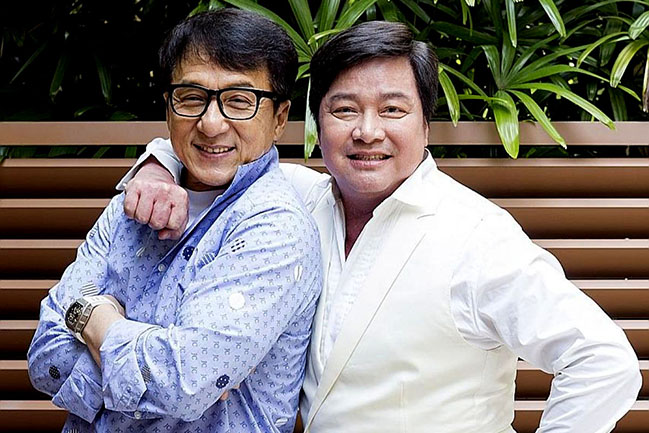

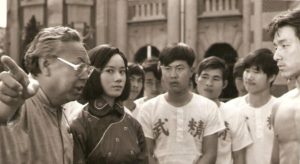
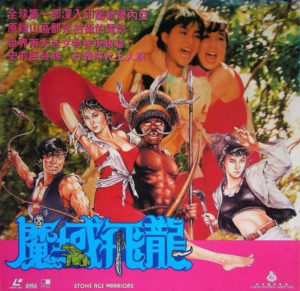
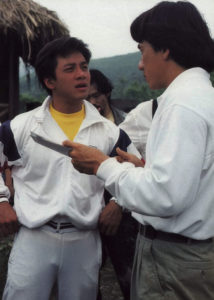
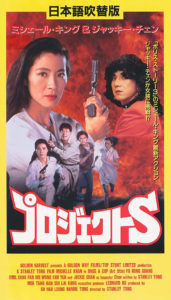
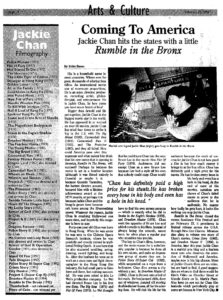
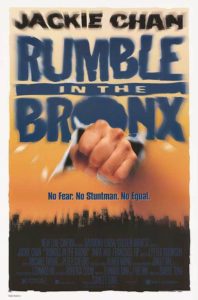
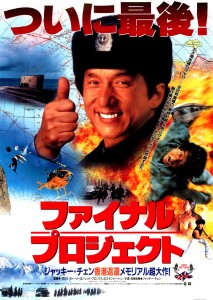
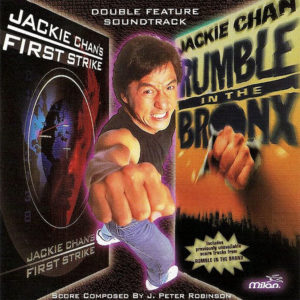
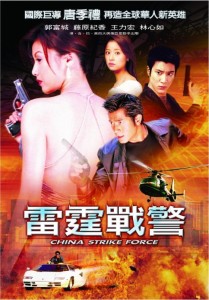
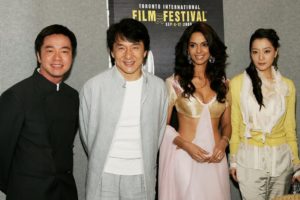
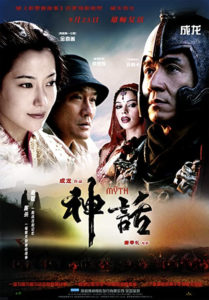
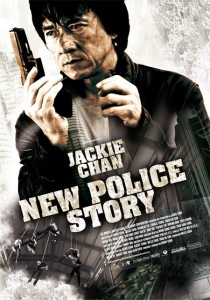
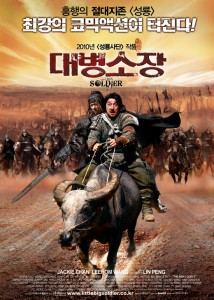
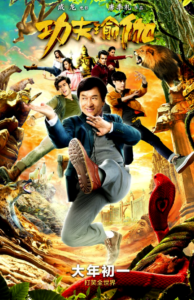

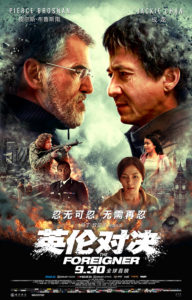
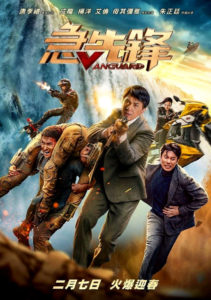
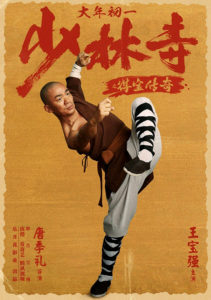



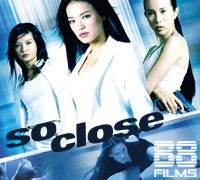
Bill Tung did call Jackie ‘Ka-Kui’ a couple of times in ‘First Strike’, but that was the only other (tenuous) connection if I remember correctly.
In regards to the hovercraft in RitB, yes it was always planned to be the finale. However there was supposed to e a fight on top of it at the end. That’s the part which was scrapped when Jackie hurt his ankle.
And Stanly doesn’t get enough credit for being the person to actually do the leap from the rooftop to the balcony in that movie as well. A lot of people think it was Jackie you see on screen doing it but it was absolutely Stanley. He did the fall from the helicopter into the water in First Strike as well. He was a underrated stuntman. He often tried a stunt first before allowing anyone else to do it.
Thanks for the insights Dan. Is it known who was expected to be Chan’s opponent in the hovercraft fight scene? It always struck me that there’s no real obvious choice in the cast who makes it feel like a missed opportunity for Chan to face off against (unlike Yuen Wah in ‘Police Story 3: Supercop’!).
Not that I’ve ever heard. Not like there was much to choose from in the movie. I mean it was a bunch of nameless goons for the most part. Oh man the way Wah was wasted in Supercop still bothers me to this day! I can’t believe the super lame way they finished him off.
I feel the article was trying to bring down Jackie Chan a bit since now that he is old. The article failed to mention that two of Jackie Chan biggest hit movies in Hong Kong were made with Stanley Tong. Police Story First Strike was Jackie Chan biggest hit in Hong Kong of all time. Kung Fu Yoga was Jackie Chan biggest hit in China, which made something like 260 million dollars. All of his movies in the 80’s where he risked his life barely cracked 6 million dollars at the Hong Kong box office. Both him and Tong continue to make movies together for a reason. They make big money together. As for the CGI, give the guy a break. He in his late 60’s. What do you expect?
The fact that Kung Fu Yoga made a ton of money in a heavily populated country where box office is a given does not change the fact that it sucked big time.
The movies where he risked his well being were still big hits and had the perfect balance of quality film making and box office return. And age should never be an excuse to overuse CGI. The Foreigner didn’t have it, and showed what guy in his 60’s is capable of.
Thanks for the comment Kevin, although I feel like your criticism of the piece is the exact reason it was written – to prove that the pairing of Chan and Tong always produced pieces of populist entertainment which were hugely successful with whatever audience they were targeted at.
My problem with CGI isn’t related to Chan’s age, it’s to do with sub-par hyenas and vomiting lions, not to mention poorly rendered car chases that would have been more impressive if done practically.
Agree that there is no excuse to overuse CGI. Even in age. Foreigner. Rambo 5. There’s even another Expendables coming out. These 60+ year old guys can still deliver the goods with a little bit of movie magic and cheating (and even some stunt doubling if they have to), but man, they really plug the useless CG in every chance they get.
What a great retrospective! I never realized how full circle Jackie Chan was with Stanley Tong, almost as if his non-Tong movies were breaks from him.
I never considered Stanley Tong to be an auteur, but he certainly knew how to film bombastic action scenes. Stone Age Warriors is a great flick and would benefit greatly from a 4K remaster. (I’ve only seen a multi-source workprint.)
Even though it’s not a good movie, I liked China Strike Force’s action scenes, and the combination fight/chase sequence with Won Jin and Aaron Kwok was great stuff. I don’t blame Won Jin at all though for that disrespectful exit of his character though.
I’ve heard people say that Jackie didn’t want Michelle Yeoh to do that motorcycle stunt in Supercop or have any action highlights because he wanted all the focus to be on him. He would constantly say that people go to Jackie Chan movies to see him in action and no one else. Did injuries catching up with him change his mind about that?
I’ve read that The reason why Jackie didn’t do that big leap in Rumble in the Bronx was because at that point in his career, his knees were like peanut brittle and he would have crippled himself. That must have been the beginning of the end for him.
Yes the main reasoning for Jackie not doing the jump was exactly that. Not that he couldn’t or wouldn’t but that many people worried he could suffer pretty catastrophic injuries if he did so, (and the movie was already running behind schedule), because of his, as you stated, “peanut brittle” legs. Now some people claimed that Jackie did the jump as well but that makes zero sense. I also don’t really like how in the outtakes they tried to make it seem like he did, (with his little dance on the balcony), but back then everyone was trying a lot harder to preserve Jackie’s legendary status.
Oh yes, it bothered me too how he was being marketed as a man who never uses stunt doubles. My friends are often dumbfounded when I point out when and where a stuntman stepped in for him.
“I also don’t really like how in the outtakes they tried to make it seem like he did, (with his little dance on the balcony), but back then everyone was trying a lot harder to preserve Jackie’s legendary status.”
I agree it’s amazing that Chan got away with this in terms of his reputation not being tarnished even after it was widely accepted that Tong did the jump. I remember reading it was a similar scenario for the scene in ‘Armour of God II: Operation Condor’ when he falls from the chain in the warehouse, apparently it was a stuntman who fell, but in the outtakes they show Jackie recovering from the fall as if it was him.
Interesting. I had never heard that about the fall in Operation Condor. If I recall he apparently suffered some pretty extensive injuries. Or at least it was said that he did, lol. I’ll have to look at that one more carefully as it certainly looks like Jackie falling off that chain as opposed to some of the other more obvious uses of a double, (crane swing in Mr. Nice Guy for example). But nothing would surprise me at this point. I mean we’re talking about a guy who was in movies which actually had stages outtakes, (the Shanghai movies for instance).
Great article Paul!!
Great article..and also kind of depressing. Chan was a living legend when I became a fan in 2000 and now he seems a tired joke with dubious politics to boot. And without the nostagic 70s trash feel that got me through clunkers like Not Scared to Die and New FIst of Fury
I really should seek out The Foriegner though!
It’s because of articles like this that I keep coming back to this site and what makes it stand out against other more general genre enthusiast sites. There’s increasingly less people as knowledgeable in HK cinema’s past and interested in HK cinema in general so I always enjoy reading these retrospectives.
There’s a lot here I didn’t know before, so I’m glad to learn something new about these figures I feel familiar with. Maybe more than the works of anyone else, the collabs between Chan and Tong epitomize the general state of Hong Kong cinema’s industry, from its early 90s heyday as peak of the international action world all the way to its dismal rock bottom as another outlet for Beijing’s propaganda… and that’s never been as evident as the way you’ve chronicled it here. Depressing as it is, Thank you nonetheless.
YM, glad you’re enjoying the articles. There’s definitely more to come. =)
Thanks for the kind words YM and equally for reading, it’s comments like yours which keep us writing!
Paul, any news on Jackie’s project with Paul Cena OPERATION X-TREME? It’s been in limbo for years.
VANGUARD was just a dud for me. I barely consider it a Jackie film. The cast of bland China youngsters just leaves me cold.
It almost feels like that one has dropped off the map! I expect it’ll stay that way a while longer though, since I’m not sure a thriller about evacuating workers from a Middle Eastern country under siege would go down particularly well at the moment considering current world events.
Add it to the lengthy list of Chan projects supposedly “in the works” but went absolutely nowhere, lol.
The difference with this one though is that they did actually complete filming. The guys over at Collider posted an insightful look into why its release continues to be delayed (coincidentally posted a day after Felix’s comment – are we being watched!?) – check it out here.
Wow, that’s some pretty shitty news. I remember a time where movies similar to current world events were a must see. I guess The Interview changed that.
Although it would suck if this movie eventually got released and turned out to be garbage.
Oh wow I didn’t know that. But yeah, reading that article has me thinking this move will never see the light of day.
Michelle Yeoh: ‘Jackie Chan thought women belonged in the kitchen – until I kicked his butt’ – https://www.theguardian.com/film/2021/sep/02/michelle-yeoh-marvel-shang-chi-legend-ten-rings-kung-fu-crazy-rich-asians-jackie-chan-butt
This is a terrific article, I would say one of Sir Paul’s finest, even if I must admit I am ‘part of the problem’—this is, when Jackie and Stanley are giving the people what they want, they’re usually giving ME what I want. I sense the Supercop/Rumble in the Bronx/First Strike trilogy is not well regarded by Jackie Chan fans these days, probably because of the trend you mention in which they prioritize big stunts and setpieces over hand-to-hand combat, but for me they are THE iconic films that introduced me to Jackie Chan. (Part of me also wonders if Jackie felt like he couldn’t top ‘Drunken Master 2’s’ final fight scene and for the rest of the 90’s decided to go for bigger and bigger stunts instead…)
That said, I will confess I haven’t watched a new Jackie Chan movie since 2016’s ‘Railroad Tigers.’ I remember I brought the Blu-ray over to a buddy’s place to watch and we just sat there dumbfounded for two hours. Funnily enough, Sir Paul actually liked that one! But this article is inspiring me to catch up on Jackie’s latest (mis)adventures. I know it’s gonna hurt but…I’ll make sure I have a strong drink in hand.
Thanks Zack, high praise coming from a COF luminary! As someone who also got into Jackie Chan in the late 90’s thanks to the advent of DVD I’m equally a fan of his collaborations with Tong from the decade (and have fond memories of trying to track down and import the Taiwanese ‘Funny’ – that was the labels name – DVD’s of ‘Rumble in the Bronx’ and ‘First Strike’, as they came with the international version on one side, and the extended Chinese version on the other!). Your theory about ‘Drunken Master 2’ isn’t one that’s ever crossed my mind, but it actually makes a lot of sense!
As for his latest misadventures, I challenge you to marathon his Unholy Trilogy in one sitting – ‘Bleeding Steel’, ‘Kung Fu Yoga’, and ‘Vanguard’. Just make sure to take the week off immediately after watching as you’ll need it to recover.
I remember thinking the villain from Bleeding Steel looked like something from a Power Rangers ep.
According to Letterboxd, Jackie Chan is my most watched actor of all time, with 58 films. But I still need to see:
The Spy Next Door (2010)
The Karate Kid (2010)
As the Light Goes Out (2014) [cameo]
Dragonblade (2015)
Skiptrace (2016)
Kung Fu Yoga (2017)
Bleeding Steel (2017)
The Knight of Shadows: Between Yin and Yang (2019)
The Iron Mask: Mystery of the Dragon Seal (2019)
The Climbers (2019) [cameo]
Vanguard (2020)
Pray for me!
You’re not missing much, lol. The Karate Kid is good but most of the rest of those are some of the worst movies I have ever seen in my life. And I don’t just mean Jackie Chan movies – I mean movies period. I wish I could erase films like Kung-Fu Yoga, Bleeding Steel, Vanguard, and The Spy Next Door from my brain.
C’mon Dan don’t discourage him. 🙂
I still need to see Dragon Mask. I know it is a Russian film with Jackie and Arnold.
Is it any good?
I mean it’s not terrible but Jackie and Arnie are only in it very briefly.
You’re right. We’re all Jackie fans here and we don’t all like and dislike the same things.
Great article Paul, detailed as always. Having been a loyal Chan fan since I was was in Primary school, I have suffered with the rest of you with his increasingly poor output. I felt Vanguard was a new low, and we all vented about that one after your spot on review!
This article demonstrates that Jackie trusts very few people to direct him and when he does he falls out with them (Wong Jing and Lau Kar Leng). You have the likes of Benny Chan, Gordon Chan and more recently Ding Sheng who are in the trusted circle. You could argue that Supercop is Jackie’s last great film. It is a shame as there are many great Hong Kong directors who could have made a great Chan film – Tsui Hark anyone ?
Ouch, ‘Supercop’ as Jackie’s last great film? I think one would have to be overly critical to come to that conclusion. For one thing, ‘Drunken Master 2’ was released a year after ‘Supercop.’ But I will always go to bat for ‘First Strike,’ and Jackie still had some minor highlights going into the late 90’s—for me, ‘Mr. Nice Guy’ (1997) represents the beginning of his downturn, but ‘Who Am I?’ (1998) and ‘Gorgeous’ (1999) aren’t bad.
I think we’d all be talking about Jackie’s career differently if he had let ‘New Police Story’ truly be his swan song back in 2004 or, hell, even ‘CZ12’ in 2012.
Thanks Jacob, glad you enjoyed it! Everyone has a different perception of what Jackie’s last great movie was. I think in terms of what we consider ‘classic Jackie’ when it comes to expectations, for me it’d be 1998’s ‘Who Am I?’. If we look purely on the merits of what constitutes a great movie though, I’d actually say ‘The Foreigner’ was his last great one, it ticked all the boxes, and saw him in a role which still played to his strengths, but in a completely different context than what we’re used to seeing.
“You could argue that Supercop is Jackie’s last great film. It is a shame as there are many great Hong Kong directors who could have made a great Chan film – Tsui Hark anyone ?”
Jackie was co-directed by both Tsui Hark and Ringo Lam for 1992’s ‘Twin Dragons’, which I don’t really class as ‘great’, but then it does have the excuse of being made as a fundraiser for the Hong Kong Directors’ Guild.
Thanks Paul, good point about Twin Dragons. I forgot Tsui was involved in that one. Fair point from Z Ravas, I watched Drunken Master 2 again recently (I bought the Warner Brothers Blu-ray, great to see the film in crisp quality, although to only have hard of hearing subtitles was a poor effort) although the action is unbelievably good, it’s a poor film. It suffers from all the worst of Hong Kong’ cinema problems, the pacing, story, and characterisation are complexly off. Why is a 40 year old Jackie playing the same mischievous fool from the 1978 original? It is unfortunate as it ruins the film overall.
The 90’s crossover trilogy of First Strike,Mr Nice Guy, Who Am I all have great moments but as Paul pointed out they are not ’good’ movies, showcasing a bland ‘Jackie’ character and terrible acting. I love the fight on top of the skyscraper in Who Am I but the fact Jackie never discovers his own identity is unforgivable. Very lazy from Chan.
I liked the Foreigner, as you say it was different but I stand by my statement that as an overall film, Supercop was the last great one.
I’m loving these Jackie chats by the way, my friends are sick of me talking about it too much!
That does sound overly critical. With Drunken Master II Jackie didn’t look his age and while still mischievous, had grown considerably since the first film. The story was just fine and the movie moved at a quick pace where you didn’t have to wait long for the next action scene.
Plus the new Blu Ray has the option of using the new or old subtitles which was a nice touch.
As far as the other films having “bad acting,” none of it was Oscar worthy, but with the exception of Mister Nice Guy, it was acceptable. Plus with Who Am I, Jackie does get his identity back when Michelle Ferre tells him that they have his files, and it’s implied that he slowly remembers everything by the film’s end.
Concerning Who Am I, Michelle Ferre has that throw away line at the end, but the character never finds out who he is while we are watching him. Surely a scene discovering or remembering who he is was needed. He clearly doesn’t remember otherwise she wouldn’t need to tell him about the files.
Come on I don’t want to rip into Drunken Master 2 too much. I do still love it, especially as it’s a true ‘Kung Fu’ film when Jackie wasn’t making those anymore. I still remember watching a shady pirate with white subtitles and being astounded. In the cold light of day with a few changes it could have been a masterpiece.
Imagine if Jackie and Anita Mui we’re married and Ti Lung was a fellow master, the plot revolved around Lau Kar Leung , who still had to convince a silly Chan to be patriotic. All the action is the same. Agreed on the finale, is there a better end fight in any Kung Fu film?
Oh man, ‘Drunken Master II’ is my favorite Jackie Chan movie! It’s the one I go back to the most, the one I use whenever I want to switch someone on to the joys of kung-fu cinema, and the one movie where I don’t think I could ever get tired of watching the finale! Plus we get Lau Kar Leung, Ti Lung, and Anita Mui sharing the screen together, as a fan of Hong Kong cinema it’s hard to beat that combination!